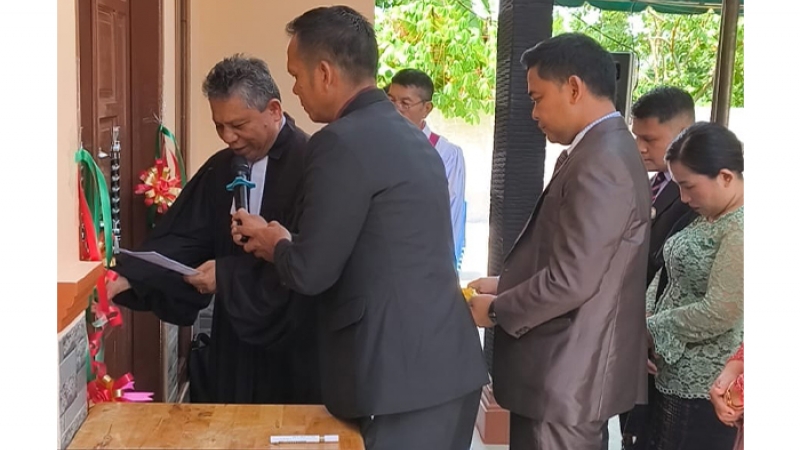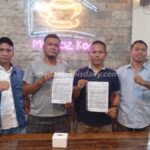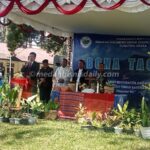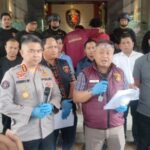HKBP Sentosa officially inaugurated the pastor’s residence and church office on Jalan Ujung Serdang, Tanjung Morawa District, Deli Serdang, on Sunday (July 20, 2025).
The inauguration began with a special service led by Rev. Hercules Sihotang MTh, the pastor of HKBP Resort Martoba, and was attended by invited guests from various congregations and ministry sectors.
This inauguration marks a significant milestone in the history of HKBP Sentosa. Previously lacking permanent ministry facilities, the church now officially has a pastor’s residence and office as part of strengthening its ministry and church management.
It also signifies the beginning of full-time ministry by Rev. Jhonsar Padang STh within the congregation.
“The construction of the pastor’s residence and office is proof that God works through His faithful people. This is not just a physical construction but also part of the spiritual and ministerial development of the congregation,” said Rev. Jhonsar.
The head of the construction committee, Hernando Simamora, reported that the project was carried out with funding collected from the congregation and donors.
The inauguration ceremony included a blessing prayer, ribbon-cutting by Rev. Hercules Sihotang and his wife, accompanied by Rev. Jhonsar Padang and his wife, as well as the signing of a commemorative plaque witnessed by the entire congregation and guests.
HKBP Sentosa
HKBP Sentosa is a Protestant Christian church in Indonesia, part of the Huria Kristen Batak Protestan (HKBP) denomination, which was established by Batak immigrants. Located in the Sentosa area, it serves as a religious and cultural hub for the Batak community, preserving their traditions and faith. The church reflects the growth of Christianity among the Batak people, who began converting in the 19th century through German Lutheran missionary efforts.
Jalan Ujung Serdang
Jalan Ujung Serdang is a road located in Serdang, a historical area in Malaysia with roots dating back to the early 20th century. The region was once part of a rubber and oil palm plantation economy under British colonial influence. Today, it serves as a local thoroughfare, reflecting the area’s development from agricultural land to a more urbanized settlement.
Tanjung Morawa District
Tanjung Morawa is a district located in Deli Serdang Regency, North Sumatra, Indonesia. Historically, it was part of the Deli Sultanate’s agricultural and trade region, known for its plantations during the Dutch colonial era. Today, it serves as a suburban area with a mix of residential, industrial, and agricultural developments.
Deli Serdang
Deli Serdang is a regency in North Sumatra, Indonesia, known for its rich cultural heritage and historical significance as part of the former Deli Sultanate. The area is characterized by a blend of Malay, Batak, and Javanese influences, with landmarks like the Sultanate’s palace and traditional villages reflecting its past. Today, it is also an agricultural hub, producing commodities like palm oil and rubber.
HKBP Resort Martoba
HKBP Resort Martoba is a retreat and recreational site owned by the Huria Kristen Batak Protestan (HKBP), the largest Protestant denomination in Indonesia. Located near Lake Toba in North Sumatra, it offers scenic views and facilities for gatherings, worship, and relaxation. The resort reflects the HKBP’s cultural and religious significance among the Batak people, blending faith with the natural beauty of the region.
pastor’s residence
A **pastor’s residence**, often called a **parsonage** or **rectory**, is a house provided by a church for its clergy to live in. These residences have historical roots in medieval Europe, where churches ensured clergy had housing near their congregations. Today, they remain functional, offering convenience for pastoral duties while reflecting local architectural styles.
church office
A church office is an administrative center within a religious institution, typically handling day-to-day operations, communications, and pastoral support. Historically, such offices evolved as churches grew in size and complexity, requiring organized record-keeping, scheduling, and community outreach. Today, they serve as a hub for clergy, staff, and volunteers to coordinate religious services, events, and charitable activities.
commemorative plaque
A commemorative plaque is a flat, inscribed marker, typically made of metal, stone, or ceramic, installed to honor a person, event, or historical significance tied to a specific location. These plaques often include names, dates, and brief descriptions to preserve memory and educate the public. They have been used for centuries, with origins tracing back to ancient Roman and Greek traditions of memorializing achievements or sacred sites.






